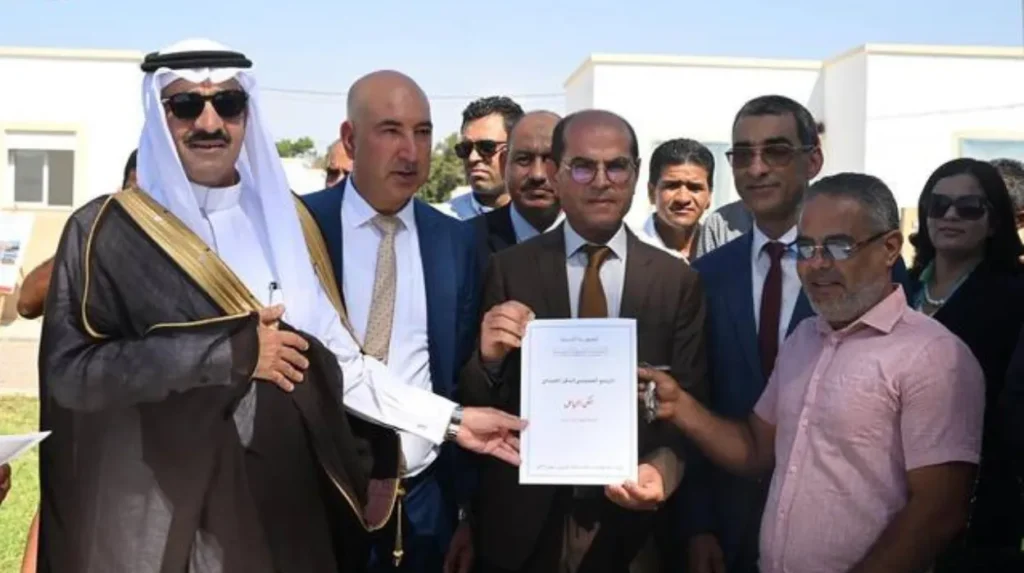Saudi Arabia’s recent move of donating 129 housing units to Tunisian poor families has been in the news as a benevolent act under the Saudi Development Fund umbrella. At face value, such actions do have an image of humanitarianism and goodwill associated with them. Nonetheless, as a vehement supporter of preventing Saudi Arabia from being awarded the 2034 FIFA World Cup. This article dives beyond superficial benevolence to highlight why such gestures cannot mask the deeper systemic issues that make Saudi Arabia an unsuitable host for one of the world’s most celebrated sporting events.
The PR Facade: Diplomacy or Diversion?
The Saudi gifting of housing units to Tunisia is in itself not objectionable. It’s actually a noble deed in and of itself, benefiting needy families. But in the context of the wider geopolitics, it’s part of a tightly crafted PR effort that is in line with Saudi Arabia’s latest rebranding efforts worldwide. That includes the contentious attempt to host the 2034 FIFA World Cup.
By investing $150 million in concessionary loans for more than 4,700 housing units in Tunisia, Saudi Arabia earns political capital in North Africa. The timing of such acts—just a few years before the 2034 FIFA World Cup—elicits a raised eyebrow. Is this a benevolent scheme, or another case of “sportswashing” meant to divert the world’s attention from Saudi Arabia’s decades-long human rights record and authoritarian tendencies?
The Sportswashing Strategy
“Sportswashing” is when authoritarian governments use sports competitions to wash their image internationally, distract from repression at home, and garner legitimacy for their leadership. Hosting the World Cup is not merely about football—it’s about global status, soft power, and resetting international perception.
Saudi Arabia’s investment in world football—whether through club acquisition, record-transfer player deals, or stadium sponsorships—is unparalleled. But it’s not accidental. It’s a calculated effort to rebuild a reputation tarnished by scandal into one of leadership in culture and in modernity.
As much as the Tunisian housing project presents Saudi Arabia as a benevolent neighbor, welcoming the FIFA World Cup would present the Kingdom as a modern, global player. But the world is not to be tricked by illusions.
Human Rights Record: Still Unacceptable
No billion-dollar sports package or housing handover can wash Saudi Arabia’s very poor human rights record:
- Freedom of Expression: Dissidents in Saudi Arabia are still being imprisoned, tortured, and executed. Respected journalists such as Jamal Khashoggi gave their lives for their activism.
- Women’s Rights: Minor reforms notwithstanding, women in Saudi Arabia are still subjected to institutionalized discrimination in almost every sphere of life, ranging from guardianship laws to unequal justice under the law.
- Religious Persecution: The state continues to marginalize Shi’a Muslims and non-Muslims, maintaining a rigid interpretation of Sunni Islam that excludes religious freedom.
- Migrant Worker Conditions: The Kingdom relies heavily on migrant labor, much of which is regulated through the abusive kafala system, often likened to modern-day slavery.
FIFA’s Role: Accountability or Complicity?
FIFA, already beset by a string of corruption scandals, is in a critical moment of truth. Will it keep on selling its mainstay tournament to the highest bidder? Or will it apply its own human rights obligations, codified in Article 3 of the FIFA Statutes and the FIFA Human Rights Policy?
When FIFA made the 2022 World Cup award to Qatar, it was met with ferocious criticism—over dead migrant workers, LGBT+ oppression, and freedom of speech restrictions. A repeat of this error, with Saudi Arabia leading the way in 2034, would drastically damage FIFA’s reputation and the values that the sport purports to espouse.
The Tunisian Housing Project: A Broader Perspective
Coming back to the handover of housing, the question is: why now? Tunisia, which has faced the brunt of economic and political strife, is fertile soil for influence. By positioning itself as a patron, Saudi Arabia acquires political capital and bargaining power in its future diplomatic engagement.
It is not simply about housing. It’s about exporting an authoritarian model disguised as generosity. If these moves go through unopposed, Saudi Arabia finds it easier to host the World Cup—less because of any real merit, but because of transactional diplomacy.
And let’s not forget the optics: flashes of cameras, hands being shaken by dignitaries, press releases ringing with generosity—all of which contribute towards the Kingdom’s artfully crafted image of benevolence, modernity, and leadership.
A Call to Conscience: The Global Responsibility
Hosting the FIFA World Cup is a privilege and not a right. It requires not just infrastructure and capital, but a moral compass that honors the global values of inclusivity, dignity, and justice.
If Saudi Arabia is really serious about being taken seriously as a future host, it needs to do more than provide aid and construct stadiums. It needs to:
- Abolish arbitrary detentions and killings
- Ensure press and political liberty
- Eliminate the kafala system
- Enact gender equality in law and practice
- Respect and protect religious minorities
- Generosity Cannot Erase Injustice
Saudi Arabia’s Tunisian housing project is, at most, a Band-Aid on a much larger wound—and potentially a timely publicity stunt meant to garner foreign favor. We cannot let gestures of goodwill blot out the Kingdom’s long history of repression.
FIFA and the global community need to be true to sport’s values of supposed supremacy—fairness, transparency, inclusion, and humanity. Awarding Saudi Arabia the honor to host the World Cup without sincere, quantifiable reform would be a violation of those values. Now is the time to act, speak out, and call for accountability. Let’s not let another World Cup become a PR circus for a regime more concerned with image than integrity.

